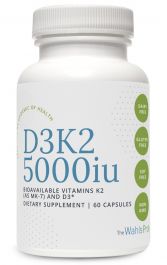
Power Zinc is a fully reacted, proprietary TRAACS® amino acid chelate formulated for enhanced absorption.
As an essential mineral, zinc serves catalytic, structural, and regulatory functions in the body.
Zinc ultimately supports immune and neurological function, growth, taste acuity, nutrient metabolism, and reproductive health.
- Supports Enzymatic Reactions and Protein Metabolism*
- Promotes Immune and Reproductive Health
- Supports Antioxidant Activity Plays a Role in Sensory Perception
Serving Size: 1 Capsule
Servings Per Container: 120
- Zinc (as TRAACS® zinc bisglycinate chelate) 20 mg 182%
* Percent Daily Values are based on a 2,000 calorie diet.
Other Ingredients: Microcrystalline cellulose, HPMC (capsule), stearic acid, magnesium stearate, and silica.
Does Not Contain: Wheat, gluten, corn, yeast, soy, animal or dairy products, fish, shellfish, peanuts, tree nuts, egg, ingredients derived from genetically modified organisms (GMOs), artificial colors, artificial sweeteners, or artificial preservatives.
Take one capsule daily, or as directed by your healthcare practitioner.
Consult your healthcare practitioner prior to use.
Individuals taking medication should discuss potential interactions with their healthcare practitioner.
Do not use if tamper seal is damaged.
STORAGE: Keep closed in a cool, dry place out of reach of children.
Our Review*
As an essential mineral, zinc serves catalytic, structural, and regulatory functions in the body. Zinc ultimately supports immune and neurological function, growth, taste acuity, nutrient metabolism, and reproductive health.(1,2) Zinc insufficiency may contribute to multiple sclerosis related pathology.(3) References Brion LP, Heyne R, Lair CS. Role of zinc in neonatal growth and brain growth: review and scoping review. Pediatr Res. 2021;89(7):1627-1640. Cuajungco MP, Lees GJ. Zinc metabolism in the brain: relevance to human neurodegenerative disorders. Neurobiol Dis. 1997;4(3-4):137-169. Hesamian MS, Eskandari N. Potential Role of Trace Elements (Al, Cu, Zn, and Se) in Multiple Sclerosis Physiopathology. Neuroimmunomodulation. 2020;27(4):163-177.







